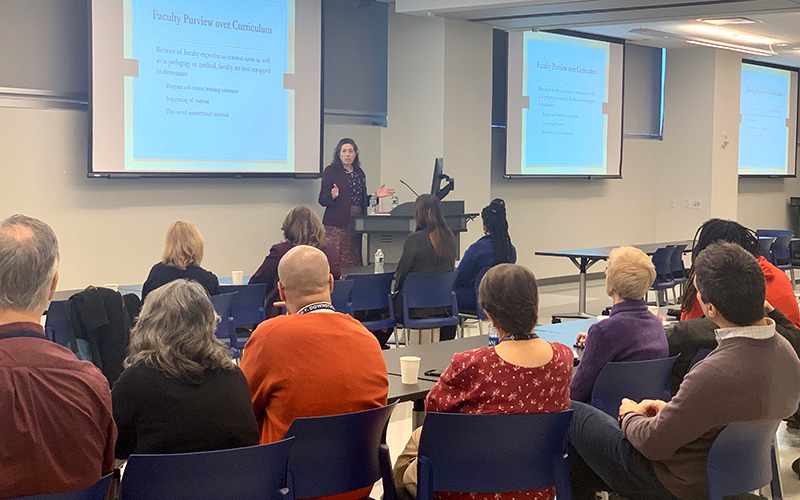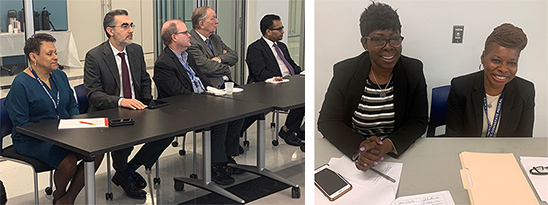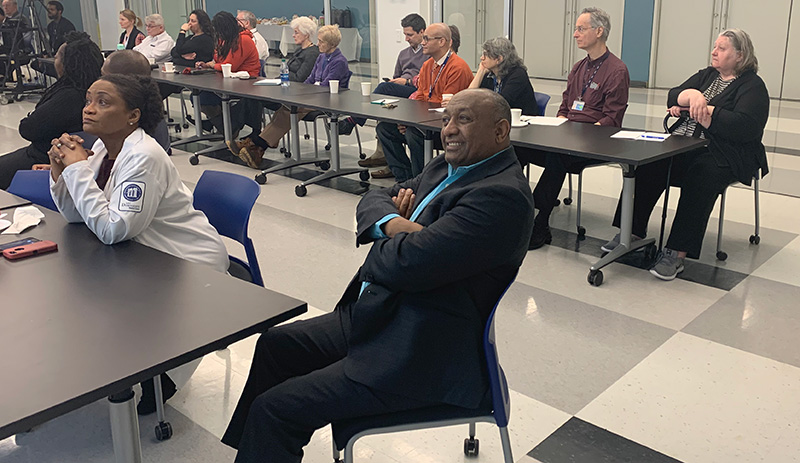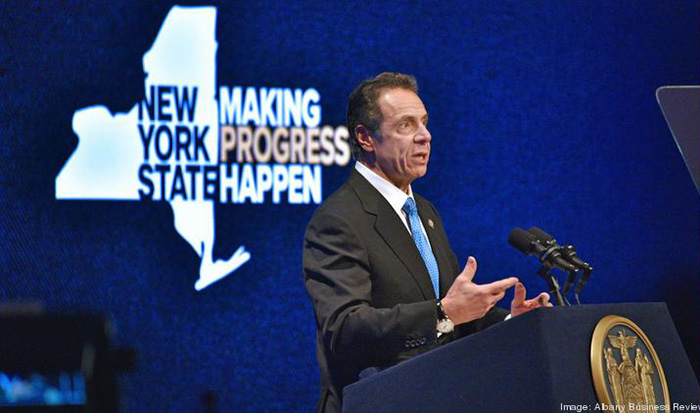Featured Story
UPD Launches Doublemap Bus Tracker App for Shuttle Services!

In case you missed the exciting news last week—SUNY Downstate has a new tool that
will make the daily parking hassle on campus much easier!
Enhancing the technology and accessibility of services on campus remains a top priority.
So, I am happy to announce our new DoubleMap Bus Tracker App. The app can be downloaded to any smartphone and allows users to track the SUNY Downstate
Shuttle Service in real-time. This means you will be able to see the estimated time
of arrival of a shuttle at each of Downstate parking lots as well as the transportation
hubs at Nostrand Ave. and Winthrop St., Church Ave., and Nostrand Ave., and Church
Ave. and East 18th St.
There are three shuttle routes – RED, BLUE and GREEN. You will be able to see which route stops at your location. The DoubleMap App will also allow shuttle users to wait in their cars or the subway station—out of
the elements—until the shuttle arrives.
I’m excited to share this new service with all of you and look forward to continuing
to improve the day-to-day campus experience with future advancements and innovations.
For full schedules and instructions on how to use and download the DoubleMap Bus Tracker
App, please click on this link to the Transportation and Shuttle Services webpage.
SUNY “Shared Governance 101”

Shared governance is one of the cornerstones that define higher education – yet there
are many misperceptions about what it actually means and how it is best implemented.
On January 6, 2020, Downstate was privileged to be visited by Dr. Gwen Kay, President of the University Faculty Senate, who has been visiting campuses across
the SUNY system to lecture on “Shared Governance 101.”
Dr. Kay has been President of the Faculty Senate since 2017, a role that also provides
her a seat on the SUNY Board of Trustees. She has been a member of SUNY Oswego’s faculty
since 2000, where she specializes in 20th-century American history. She holds a Ph.D. in the History of Medicine and Science
from Yale University.
The University Faculty Senate (UFS) is the official body through which faculty across
the SUNY system engage in governance of the University. UFS is a representational
body, comprised of members elected from each SUNY campus for set terms of office.
It is an advisory body, meaning that UFS has the power to recommend and endorse, but
does not have fiscal or final decision-making authority.
At the campus level, each SUNY campus elects representatives to UFS who also serve
as part of the governance structure at their own campus. And while every campus implements
its model of shared governance somewhat differently, said Dr. Kay, the core concept
is broadly the same for all: shared governance is “the structures and processes through
which faculty, professional staff, administration, and governing boards participate
in the development of policies and in decision-making that affect the institution.”
In the Downstate model, those elected to the University Faculty Senate represent both
the faculty and professional staff.
Collectively, these bodies have the same ultimate goal, said Dr. Kay. “We all want
the best outcomes for our students.”
Most academic institutions, including SUNY, recognize that faculty should have a primary
role, through a well-established governance structure, in formulating policy in the
“academic space,” related to such things as curricula, methods of instruction, academic
standards/rules, and assessment. Further, faculty should have significant input –
again, through their governance structure – into other areas that affect the academic
functions of the institution, including but not limited to, the budget, planning processes,
institutional assessment, searches for key leaders, and policy.


Dr. Kay outlined indicators of good shared governance. It is important, she said,
that those who contribute to the shared governance process have a collective understanding
of the roles played by each of the key constituents (the Board, the President, and
the Faculty) – and of the importance of staying within their own lanes.
The goal is to build consensus among all bodies. She believes that in the best shared
governance models, joint decision-making is built on trust and respect, with strong
communication and transparency being key.
I would like to thank Dr. Nicholas Penington, Associate Professor of Physiology and
Pharmacology/and UFS Presiding Officer and all of our elected governance representatives
for hosting Dr. Kay’s visit to our campus. In addition to her seminar, Dr. Kay also
met with our Chief Academic Officer and Distinguished Service Professor, Pascal James
Imperato, MD, MPH&TM, MACP, our UFS officers and alternates, and with our Centerwide
Faculty and Professional Staff Executive Committee.
For more on shared governance, check out:
Dr. Kay’s presentation
SUNY’s Shared Governance website
and Downstate’s Faculty Governance site
Downstate’s representatives to the University Faculty Senate are:
Presiding Officer| Nicholas Penington, Ph.D., Associate Professor of Physiology and Pharmacology, College
of Medicine/School of Graduate Studies
University Faculty Senator| Anika Daniels-Osaze, Ed.D., Director, Office of Diversity Education and Research
University Faculty Senator| Brigitte Desport, DPS, OTR/L, BCP, ATP, Associate Dean for Strategic Initiatives
and Assistant Professor of Occupational Therapy, School of Health Professions
University Faculty Senator| Alexander Schwartzman, M.D., MBA, FACS, Clinical Professor and Interim Chair of
Surgery, College of Medicine
University Faculty Senator| Ninfa Mehta, M.D., Professor of Emergency Medicine, College of Medicine
University Faculty Senator, 1st Alternate| Alithia Alleyne, CMHFA, Program Administrator for Occupational Therapy, School of
Health Professions
University Faculty Senator, 2nd Alternate| Laura Martello-Rooney, Ph.D., Research Assistant Professor of Medicine, College
of Medicine and School of Graduate Studies
University Faculty Senator, 3rd Alternate| Rauno Joks, M.D., Associate Professor and Chief of allergy and Immunology, College
of Medicine
University Faculty Senator, 4th Alternate| Jasmin Thomas, OTD, MS, OTR/L, Assistant Professor of Occupational Therapy, School
of Health Professions.
Governor Cuomo's 2020 State of the State

Last week, Governor Andrew Cuomo convened his 10th State of the State Address—laying out a progressive agenda for 2020 that touched
on civil rights, health care, the environment, public safety, and economic development.
I want to express our strong support for Governor Cuomo’s programs announced during
his address on Wednesday. These programs will greatly benefit our students, patients,
the community of Brooklyn, and the entire state.
As an academic medical center dedicated to attracting economically disadvantaged and
underrepresented students into healthcare professions, we could not be more thrilled
at the Governor’s proposal to expand the Excelsior Scholarship program, as well as
his commitment to expand opportunities in higher education.
Additionally, the Governor’s proposal to convene a Medicaid Redesign Team is critical
to meeting the healthcare needs of our citizens, as are his proposals to provide additional
protections for patients.
On behalf of this great institution, I am proud to work with the Governor’s office
to advance his agenda and serving citizens in the great state of New York. I look
forward to a brighter future for all of our constituents as the Governor’s proposals
become reality.
For those who missed it, you can watch Governor Cuomo’s full 2020 State of the State Address here!
|